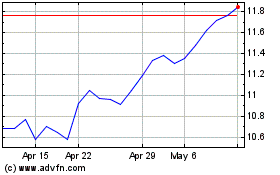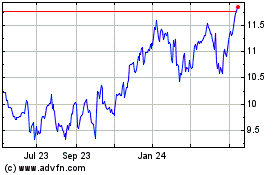Europe's Meat Retailers, Processors, Swallow Added Meat-Testing Costs
05 March 2013 - 6:22AM
Dow Jones News
Europe's food industry is adopting tougher measures to trace
meat throughout its complex supply chain, with retailers and
processors swallowing the extra costs of verification and testing
to woo back consumers angered by the presence of horsemeat in
products labeled as beef.
However, if the food industry manages to reduce the number of
links between farmer and consumer by cutting out processors that
can't give a clear account of their supply chain, that could create
more value for some producers, processors and retailers, said
agriculture-industry experts and academics.
Large U.K. supermarket chains learned in January that beef
burgers they were selling contained traces of horse and pig DNA.
Since then, shopping habits have changed throughout Europe. Sales
of frozen burgers in the U.K. plunged 43% on the year during the
four weeks ending Feb. 17, according to market researcher Kantar
Worldpanel.
"We expect in the long term a simplification of the food supply
chain, with retailers stepping up investment in procurement
divisions that deal directly with suppliers and reduce the number
of intermediaries involved," said Francisco Redruello, senior
research analyst at Euromonitor International.
Introducing product traceability and an assurance system
throughout the food chain could add around 5% to a product's cost,
said Justin Sherrard, a global strategist at Rabobank. However, the
additional costs, including of DNA testing, will fall more on food
processors and retailers than on final consumers.
Retailer Tesco PLC's (TSCO.LN, TSCDY) Chief Executive Philip
Clarke said the company will source more of its meat "closer to
home."
"Where changes are needed, we'll make sure they are made," Mr.
Clarke said. But he added, "Let me be clear that this doesn't mean
more expensive food."
Tesco is building a new website, to enable customers to see
progress being made in the company's DNA-testing program, and
showing which products have been tested, Mr. Clarke said.
Nestle SA (NESN.VX, NSRGY), which manufactures food products,
has also suspended deliveries of some finished products made using
beef.
"Despite our own strict controls, despite receiving certificates
and repeated guarantees from our suppliers, DNA tests have showed
that we have been supplied with beef that is mixed with horsemeat,"
said Nestle's corporate spokesperson Meike Schmidt. "There is no
food safety issue, but the mislabeling of products means they fail
to meet the very high standards consumers expect from us."
Nestle has carried out hundreds of analyses in an enhanced
testing program, which by late February had covered about 70% of
the company's beef or veal products manufactured in Europe, Ms.
Schmidt said.
The cost of improving the meat supply chain will be diluted for
large retailers such as Tesco or manufacturers such as Nestle
because meat products make up only a fraction of their brands,
Fitch Ratings said.
Meanwhile, a company with more integrated operations, for
instance Wm. Morrison Supermarkets PLC (MRW.LN, MRWSY), has been
unscathed by the scandal as the company has its own meat-processing
and manufacturing facilities in the U.K., Fitch said.
Morrisons said it is confident about its own supply chain for
fresh meat, most of which comes from U.K.-bred cattle slaughtered
by its own abattoirs, but added it has to rely on other suppliers
for products, such as ready meals. "We can't be complacent;
whenever you outsource, that builds a level of risk that we try and
mitigate," spokesman Julian Bailey said.
Write to Michael Haddon at michael.haddon@dowjones.com and Neena
Rai at neena.rai@dowjones.com
Subscribe to WSJ: http://online.wsj.com?mod=djnwires
Tesco (PK) (USOTC:TSCDY)
Historical Stock Chart
From Jun 2024 to Jul 2024

Tesco (PK) (USOTC:TSCDY)
Historical Stock Chart
From Jul 2023 to Jul 2024
